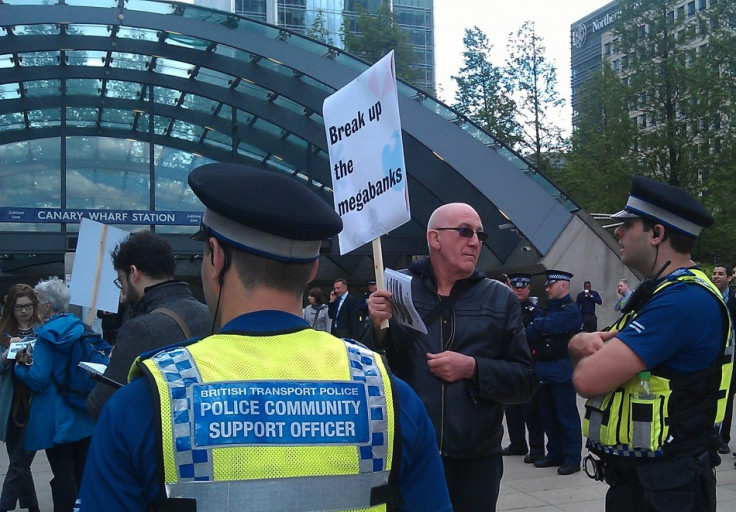Occupy Economics: Break up UK Banks or Risk Another Financial Crisis

Break up Britain's biggest banks or risk another financial catastrophe further down the line, warns a new campaign.
Occupy Economics, a strand of the global movement to reform the banking industry born on Wall Street in late 2011, is calling for government to "end bank welfare."
Campaigners says taxpayer-funded bailouts should stop and by fracturing the big finance institutions in the sector, this will create a more competitive market of smaller players.
"We know that there's still huge public anger about the banks. We know that they want to see real change that is going to stop a disaster like 2008 happening again," said Naomi Colvin, Occupy Economics spokeswoman, at the Break up the Banks campaign launch in London's Canary Wharf.
"The only people who don't want to see change, it seems, are politicians and the bank executives."
The campaigners say that the experts, such as the Bank of England Executive Director of Financial Stability Andy Haldane, agrees with them.
They have launched Break up the Banks to coincide with the impending release of the latest report from the Parliamentary Commission on Banking Standards, which is a group set up by the government, in the wake of the Libor fixing scandal to look at the culture within the financial sector.
Organisers say they intend to launch a petition to try and force a parliamentary debate on fragmenting the large banks in the system.
"Banks are too big to fail at the moment and they need to be made smaller so they can be allowed to fail," said Jonathan Harrison, part of the Break up the Banks protest and an advocate of online currency Bitcoin.
"You have moral hazard when banks are this large and when they did collapse, if you had let some of the big banks go down we wouldn't have been able to get cash out of the ATM and the whole of society could have broken down overnight."
Another protestor under Canary Wharf's glistening towers said he is anxious about the potential impact on future generations if the financial system is not comprehensively reformed.

"I'm just worried that the whole system doesn't seem to be repairing itself. All that's happening is that governments around the world are funding out, of our current tax revenues, to the same Frankenstein organisations as before 2008," said Alex Moody, a small business owner who described himself as a "concerned citizen".
"I have children and I'm concerned that they're going to be paying for this in 20, 30, or 40 years down the line.
"The bailout of the banks is almost as bad as a world war, in terms of the financial cost. That's a very serious matter."
After the financial system went into meltdown, triggered by the 2007 sub-prime mortgage crisis in the US, the government stepped in and spent billions bailing out some of Britain's biggest banks.
It still owns 80% of RBS and 40% of Lloyds as a result of the intervention. When the government does eventually sell off its holdings, the taxpayer stands to lose billions of pounds.
Structural reforms are taking place. The financial sector regulatory regime has been revamped, with watchdog powers mostly transferring to the Bank of England's Prudential Regulatory Authority.
Under the changes, banks must build up their protective capital buffers to prevent future government bailouts being needed. The must also ring-fence retail banking from any commercial arm - often called the "casino" side - by 2019.
The government has also said it wants to make market entry for new, smaller banks easier, to encourage greater competition in the market and more options for consumers.
© Copyright IBTimes 2025. All rights reserved.






















